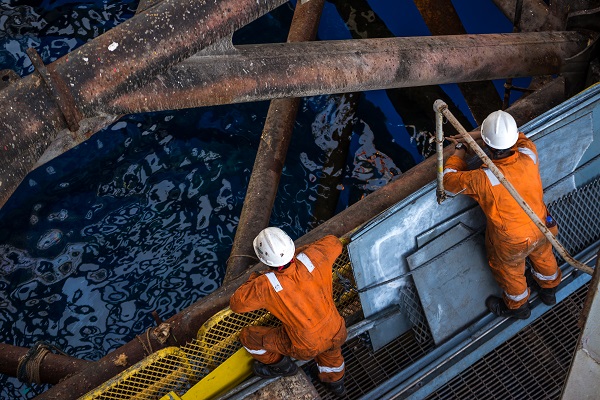We don’t have to tell you that maritime work has always been risky. As you know, it’s gotten even more risky in the past couple of months, as the deadly COVID-19 virus spreads around the world. Despite the dangers, maintaining the flow of maritime commerce is vital to America’s economy; without the efforts of dedicated maritime workers, this crisis would quickly become a full blown disaster.

Here’s a partial list of the maritime positions the Department of Homeland Security has identified as being essential for sustaining the continuous flow of maritime commerce:
If you’re a maritime worker, there’s a good chance your job title appears on this list.
Protecting Maritime Workers from COVID-19/Coronavirus
Working during the COVID-19 outbreak is similar to working in any other hazardous condition for maritime workers — following the proper safety rules is the best way to prevent anyone from getting hurt, or in this case, sick.
Maritime workers should take the necessary steps to protect themselves and their coworkers from getting sick. This includes:
Vessel owners are obligated to provide adequate medical care to their employees while onboard a vessel. This includes regular testing for COVID-19. Vessel owners who fail to take the needed measures to ensure a safe work environment may be liable if an employee becomes ill while working on their ship.
What if the Worse Happens?
But what if the worse happens? What options does a seaman or other maritime worker have if they become ill and unable to work after contracting COVID-19 while on the job?
The Jones Act and General Maritime Law
Under the Jones Act, a seaman who becomes ill while in the service of a ship is entitled to recover maintenance and cure. “Maintenance” refers to a seaman’s living expenses (food, rent, etc.), while “Cure” refers to the seaman’s medical expenses. In order to claim maintenance and cure benefits, a seaman must be able to show that they became ill while in the service of a ship.
These benefits must be paid until a seaman reaches maximum medical recovery. In addition, an employer must pay wages to the end of the voyage for a seaman whose hitch was cut short due to their illness.
If the illness resulted from the negligence of a ship’s owners or the unseaworthiness of a vessel, the Jones Act and General Maritime Law allows seaman to seek additional damages such as pain and suffering, long-term medical expenses and loss of income if they are unable to return to work because of their illness.
Longshore and Harbor Workers’ Compensation Act (LHWCA)
Stevedores, ship repairmen, and harbor workers are entitled to workers’ compensation benefits under the Longshore and Harbor Workers’ Compensation Act (LHWCA). The LHWCA provides compensation, rehabilitation and medical care to workers who become injured or ill while working “upon the navigable waters of the United States” in jobs that assist in maritime commerce.
Injured maritime workers who qualify for relief under the LHWCA are entitled to disability payments, medical care and vocational rehabilitation compensation if they are unable to return to work due to their injuries or illness. It also provides wrongful death benefits to surviving a spouse and children if a worker suffers a job-related injury or illness that causes or contributes to his or her death.
Outer Continental Shelf Lands Act (OCSLA)
The Outer Continental Shelf Lands Act (OCSLA) extends the protections of the Longshore and Harbor Workers’ Compensation Act to include workers on offshore platforms on the Outer Continental Shelf, such as compensation for medical costs, disability payments and rehabilitation costs for workers who become ill or injured on the OCS.
The OCSLA also provides death benefits for families of workers who have died as a result of their illness or injuries. Eligible workers don’t have to prove negligence in order to receive benefits.
Death on the High Seas Act (DOSHA)
The Death on the High Seas Act, or DOHSA, provides relief for the families of workers who succumbed to COVID-10 after contracting the disease due to the unseaworthiness of a vessel while in international waters.
Essential Maritime Workers Rights for Job-Related COVID-19
The New Orleans maritime injury attorneys at Lambert Zainey want everyone to be careful and safe during these uncertain times.
If you’ve become ill due to COVID-19, the first thing to do is get medical treatment as early as possible. The sooner treatment begins, the better your chances of recovery.
Maritime workers who are unable to work due to COVID-19 are protected under the Jones Act and other maritime laws. If you’re unsure which laws apply to your situation, give Lambert Zainey a call. Lambert Zainey has been protecting the rights of maritime workers all over the U.S. for over 40 years. During that time we’ve obtained hundreds of millions of dollars in settlements for our clients.
We urge you to contact the Lambert Firm to discuss your maritime COVID-19 case with one of our Maritime Injury Attorneys. If you are unable to come to our offices, we would be more than happy to meet with you in your hospital room, at home, or via conference call. We can review the facts in your case, answer any legal questions you may have and provide helpful advice on the best way to move forward in your situation.
